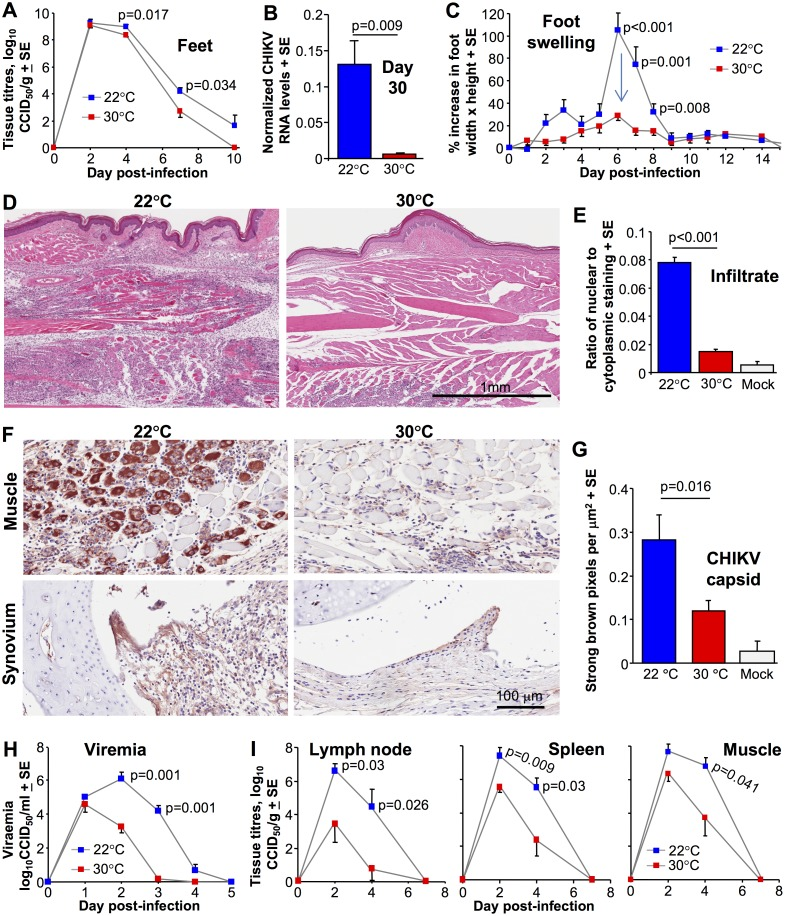Lower temperatures reduce type I interferon activity and promote alphaviral arthritis.
Chikungunya virus (CHIKV) belongs to a group of mosquito-borne alphaviruses associated with acute and chronic arthropathy, with peripheral and limb joints most commonly affected. Using a mouse model of CHIKV infection and arthritic disease, we show that CHIKV replication and the ensuing foot arthropathy were dramatically reduced when mice were housed at 30°C, rather than the conventional 22°C. The effect was not associated with a detectable fever, but was dependent on type I interferon responses. Bioinformatics analyses of RNA-Seq data after injection of poly(I:C)/jetPEI suggested the unfolded protein response and certain type I interferon responses are promoted when feet are slightly warmer. The ambient temperature thus appears able profoundly to effect anti-viral activity in the periphery, with clear consequences for alphaviral replication and the ensuing arthropathy. These observations may provide an explanation for why alphaviral arthropathies are largely restricted to joints of the limbs and the extremities.
Authors
Natalie A Prow; Bing Tang; Joy Gardner; Thuy T Le; Adam Taylor; Yee S Poo; Eri Nakayama; Thiago D C Hirata; Helder I Nakaya; Andrii Slonchak; Pamela Mukhopadhyay; Suresh Mahalingam; Wayne A Schroder; William Klimstra; Andreas Suhrbier
External link
Publication Year
Publication Journal
Associeted Project
Microbiology or Immunology
Lista de serviços
-
As antisense RNA gets intronic.As antisense RNA gets intronic.
-
Androgen responsive intronic non-coding RNAs.Androgen responsive intronic non-coding RNAs.
-
Conserved tissue expression signatures of intronic noncoding RNAs transcribed from human and mouse loci.Conserved tissue expression signatures of intronic noncoding RNAs transcribed from human and mouse loci.
-
The intronic long noncoding RNA ANRASSF1 recruits PRC2 to the RASSF1A promoter, reducing the expression of RASSF1A and increasing cell proliferation.The intronic long noncoding RNA ANRASSF1 recruits PRC2 to the RASSF1A promoter, reducing the expression of RASSF1A and increasing cell proliferation.
-
Antisense intronic non-coding RNA levels correlate to the degree of tumor differentiation in prostate cancer.Antisense intronic non-coding RNA levels correlate to the degree of tumor differentiation in prostate cancer.
-
Insight Into the Long Noncoding RNA and mRNA Coexpression Profile in the Human Blood Transcriptome Upon Leishmania infantum Infection.Insight Into the Long Noncoding RNA and mRNA Coexpression Profile in the Human Blood Transcriptome Upon Leishmania infantum Infection.
-
Long non-coding RNAs associated with infection and vaccine-induced immunityLong non-coding RNAs associated with infection and vaccine-induced immunity
-
Comparative transcriptomic analysis of long noncoding RNAs in Leishmania-infected human macrophagesComparative transcriptomic analysis of long noncoding RNAs in Leishmania-infected human macrophages
-
SARS-CoV-2 Selectively Induces the Expression of Unproductive Splicing Isoforms of Interferon, Class I MHC, and Splicing Machinery Genes.SARS-CoV-2 Selectively Induces the Expression of Unproductive Splicing Isoforms of Interferon, Class I MHC, and Splicing Machinery Genes.

